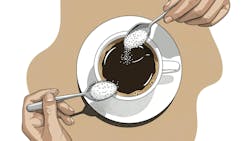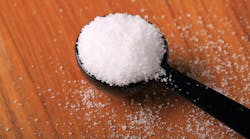Xylitol vs. erythritol: Understanding and misunderstandings
Xylitol and erythritol are both sugar alcohols, or polyols, that are used as sugar substitutes. While both are known for their ability to inhibit Streptococcus mutans, reduce bacterial adhesion to teeth, and stimulate saliva flow, studies suggest erythritol may offer even greater protection by reducing plaque accumulation and delaying the onset of cavities.
Three clinical studies lasting two to six months, and one lasting three years,1 have demonstrated that consumption of candy or chewable tablets containing erythritol (5–7.5 gm per day) inhibited formation of dental plaque in young children, teenagers, and adults.2-4 In vitro studies suggest that erythritol, and also sorbitol and xylitol, inhibit bacterial growth due to an osmotic effect.5 However, erythritol causes more marked inhibition of bacterial growth than sorbitol and xylitol,2 likely due to its ability to passively pass through the bacterial cell membrane where it interferes with growth pathways.6 The ability of erythritol compared with sorbitol or xylitol to slow the development of dental caries was demonstrated in two three-year studies in children 8 to 9 years old and 14 to 15 years old.7,8 De Cock et al. concluded that the evidence demonstrates erythritol is more effective than sorbitol or xylitol at maintaining and improving oral health.5 In one study, Dr. John Burgess showed a hard candy (Dream Candy) provided significant protection to teeth.9
Although they share the same family and have some similar properties, xylitol and erythritol differ in many ways.
Source: Xylitol does not occur naturally and is obtained from birch wood pulp, while erythritol is naturally occurring in many fruits and vegetables; it is commercially obtained by fermenting dextrose from corn, wheat, or fruits.
Taste: Xylitol has a sweetness that is similar to sugar, while erythritol is about 60%–80% as sweet as sugar.
Glycemic index: Xylitol has a glycemic index (GI) of 7, while erythritol has a GI of 0 (zero); as such, it is a better option for diabetics.
Absorption: About 50% of the xylitol consumed is absorbed in the small intestine and metabolized in the liver, while erythritol is rapidly absorbed in the small intestine and excreted in the urine without much change.
Bloodstream: Xylitol is metabolized in the liver into xylose, which is then converted to glucose and released into the bloodstream, while erythritol is metabolized and excreted in the urine unchanged. Consequently, it does not affect the blood glucose or insulin levels.
Digestive effects: Xylitol can cause digestive upset in some people, such as bloating, gas, and diarrhea, while erythritol is generally well tolerated and does not cause digestive problems in most people.
Toxicity: The upper limits of tolerance for erythritol are much higher than xylitol and other polyols.
Maximum dose: Studies have suggested that the maximum dose for xylitol is 0.3 g/kg, while for erythritol it is 0.66 g/kg, which is more than double.10
Pets: Xylitol can be highly toxic to pets, while erythritol is safe.
Other health benefits: In a study, erythritol showed a considerable radical scavenging activity, antioxidant activity, alpha amylase and glucosidase enzyme inhibition property, improved antioxidant status, and ameliorated blood glucose, HbA1c, and glucose intolerance following diabetes.11
Cost: The net cost of erythritol is higher than xylitol since erythritol is only 60%–80% as sweet; as such, you need to use a lot more of it to get the same level of sweetness.
Conclusion
Both xylitol and erythritol are healthy sugar substitutes. Erythritol is well tolerated, slightly less sweet, and may have some additional health benefits, including being an antioxidant, whereas xylitol can cause digestive upset in some people. Although xylitol is used and referenced extensively for dental products, erythritol may be a better option for many of our patients. The best choice for you depends on your personal preferences and any digestive sensitivities you may have.
Editor's note: This article appeared in the May 2025 print edition of Dental Economics magazine. Dentists in North America are eligible for a complimentary print subscription. Sign up here.
References
- Runnel R, Makinen KK, Honkala S, et al. Effect of three-year consumption of erythritol, xylitol and sorbitol candies on various plaque and salivary caries-related variables. J Dent. 2013;41:1236-1244. doi:10.1016/j.jdent.2013.09.007
- Makinen KK, Saag M, Isotupa KP, et al. Similarity of the effects of erythritol and xylitol on some risk factors of dental caries. Caries Res. 2005;39:207-215. doi:10.1159/000084800
- Makinen KK, Isotupa KP, Kivilompolo T, Makinen PL, Toivanen J, Soderling E. Comparison of erythritol and xylitol saliva stimulants in the control of dental plaque and mutans streptococci. Caries Res. 2001;35:129-135. doi:10.1159/000047444
- Makinen KK, Isotupa KP, Kivilompolo T, et al. The effect of polyol-combinant saliva stimulants on S. mutans levels in plaque and saliva of patients with mental retardation. Spec Care Dentist. 2002;22:187-193. doi:10.1111/j.1754-4505.2002.tb00269.x
- de Cock P, Makinen K, Honkala E, Saag M, Kennepohl E, Eapen A. Erythritol is more effective than xylitol and sorbitol in managing oral health endpoints. Int J Dent. 2016;2016:9868421. doi:10.1155/2016/9868421
- Hashino E, Kuboniwa M, Alghamdi SA, et al. Erythritol alters microstructure and metabolomic profiles of biofilm composed of Streptococcus gordonii and Porphyromonas gingivalis. Mol Oral Microbiol. 2013;28:435-451. doi:10.1111/omi.12037
- Honkala S, Runnel R, Saag M, et al. Effect of erythritol and xylitol on dental caries prevention in children. Caries Res. 2014;48:482-490. doi:10.1159/000358399
- Falony G, Honkala S, Runnel R, et al. Long-term effect of erythritol on dental caries development during childhood: a posttreatment survival analysis. Caries Res. 2016;50:579-588. doi:10.1159/000450762
- Mon H, Wang Y, Stumpff M, Yu Q, Xu X, Burgess J. Artificial caries study on caries-inhibition effects of experimental candies. 2023 AADOCR/CADR Annual Meeting; Portland, OR; 2023. https://iadr.abstractarchives.com/abstract/52am-3830740/artificial-caries-study-on-caries-inhibition-effects-of-experimental-candies
- Mäkinen KK. Gastrointestinal disturbances associated with the consumption of sugar alcohols with special consideration of xylitol: scientific review and instructions for dentists and other health-care professionals. Int J Dent. 2016;2016:5967907. doi:1155/2016/5967907
- Soetan OA, Ajao FO, Ajayi AF. Blood glucose lowering and anti-oxidant potential of erythritol: an in vitro and in vivo study. J Diabetes Metab Disord. 2023;22(2):1217-1229. doi:1007/s40200-023-01237-x
About the Author

Mohamed Harunani, DDS
Mohamed Harunani, DDS, has spent the last 40 years studying the etiology and treatment of caries. He has received numerous accolades and has held various positions in dental organizations. Dr. Harunani invented Dream candies, delicious treats that have been engineered to neutralize oral acids, promote remineralization, and decrease plaque.

